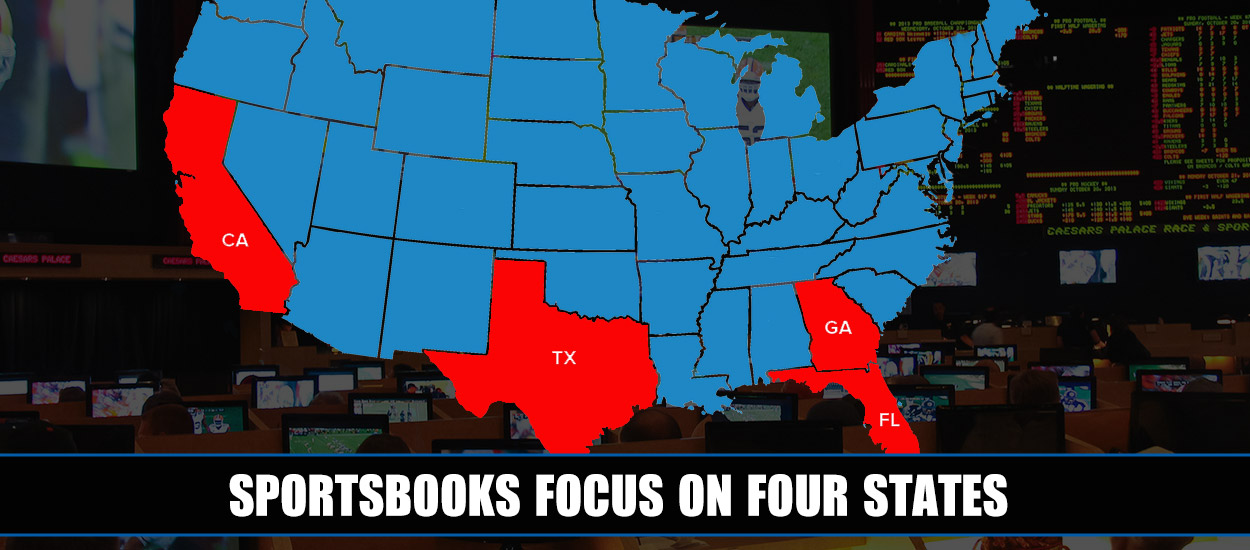These four states will alter the U.S. sports betting landscape
At the time of this writing, 33 states, along with Washington DC, have passed bills that licensed and regulated sports betting in some form or another, whether they have started offering the product or not. Other states have sports betting in their sights, but four big states for sportsbooks are still a long way away from legislation to legalize the activity. It is evident that Utah and Alaska will never allow sports betting, since it goes against their basic moral stance that prohibits gambling in any shape or form, and Hawaii is unlikely to pass anything soon either, since they have no gambling across the islands. While a bill is on the table to examine sports betting in Hawaii, there are still no forms of gambling in the state, as most legislators and anti-gambling groups oppose gambling, believing it will attract the wrong type of people and negatively affect tourism. It seems almost certain that Kentucky, Missouri and Minnesota will be the next states to pass sports betting legislation, while Vermont, Maine and Nebraska, which already passed legislation, will launch soon. Alabama, Idaho, Oklahoma and South Carolina will probably regulate it at some point also, but it is hard to envision anything happening there anytime soon.
It is evident that Utah and Alaska will never allow sports betting, since it goes against their basic moral stance that prohibits gambling in any shape or form, and Hawaii is unlikely to pass anything soon either, since they have no gambling across the islands. While a bill is on the table to examine sports betting in Hawaii, there are still no forms of gambling in the state, as most legislators and anti-gambling groups oppose gambling, believing it will attract the wrong type of people and negatively affect tourism. It seems almost certain that Kentucky, Missouri and Minnesota will be the next states to pass sports betting legislation, while Vermont, Maine and Nebraska, which already passed legislation, will launch soon. Alabama, Idaho, Oklahoma and South Carolina will probably regulate it at some point also, but it is hard to envision anything happening there anytime soon.
Four States
That leaves four states, California, Texas, Florida and Georgia not mentioned. And, they are the ones that the big sportsbooks are most interested in, if for no other reason than their sheer size. Those four states have a combined population of almost 102 million people and make up over 30% of the entire U.S. population. They are also among the most proliferate states for sports interest, both professional and amateur, including 48 professional sports teams and 41 Division I NCAA schools.
The Sunshine State
The situation in Florida is well known and documented. In May 2021, Governor Ron DeSantis gave the Seminole Tribe a compact that would provide the Tribe with exclusive rights to offer sports betting. It could offer online sports betting from servers located on the reserve and it also allowed them to partner with pari-mutuel facilities to offer land-based sports betting. The Seminoles guaranteed a minimum of $2.5 billion in revenue to the state over five years and it was estimated that they would generate $6 billion by 2030. The Seminoles almost immediately partnered with Hard Rock Casino to offer sports betting at their facilities and help create an app and by November they launched a sports betting app. 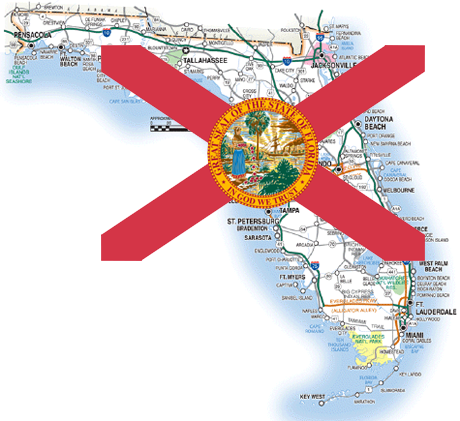 The compact was challenged by the Magic City Casino and Bonita Springs Poker Room who said the compact was illegal since the Indian Gaming Regulation Act (IGRA) required all betting to take place exclusively on Indian lands. They launched a lawsuit against the Florida Department of the Interior in Florida and later in D.C. as well. DraftKings and FanDuel lent support to the lawsuit, and they elicited signatures to oppose the compact generating close to a half million signatures. Hard Rock agreed to temporarily suspend operations in Florida and shut down the app pending settlement of the suit.
The compact was challenged by the Magic City Casino and Bonita Springs Poker Room who said the compact was illegal since the Indian Gaming Regulation Act (IGRA) required all betting to take place exclusively on Indian lands. They launched a lawsuit against the Florida Department of the Interior in Florida and later in D.C. as well. DraftKings and FanDuel lent support to the lawsuit, and they elicited signatures to oppose the compact generating close to a half million signatures. Hard Rock agreed to temporarily suspend operations in Florida and shut down the app pending settlement of the suit.
Despite agreement among legal experts that the compact could violate IGRA rules, President Joe Biden and others in the government urged the courts to allow the compact to go forward and deny the lawsuit in support of Indian sovereignty. But a federal court ruled that the compact indeed violated federal law and told the groups to go back to the drawing board. With the midterm elections taking place in 2022, the issue was never really addressed, and no sports betting took place in Florida in 2022 and it is expected nothing will be heard on the issue until at least this fall. To add fuel to the fire, an anti-gambling group called No Casinos has demanded that any gambling expansion not even be considered unless it is approved by voters in a referendum. If the courts and government agree to that stipulation, it is most likely the compact in Florida will not even be addressed again until the 2024 November election. By all accounts, the major sportsbook operators are getting their legal teams ready for the fight to demand that non-Tribal sports betting be allowed to operate, even if done off of Native American lands.
Cali
California sports betting, like Florida, is a fight between the Tribes and other interests. In this case those are pari-mutuel companies, poker rooms and the government. California law gives exclusive rights to the Tribes to offer non-pari-mutuel betting, but unlike Florida, there are multiple tribes in California, all with competing beliefs and desires when it comes to gambling expansion. 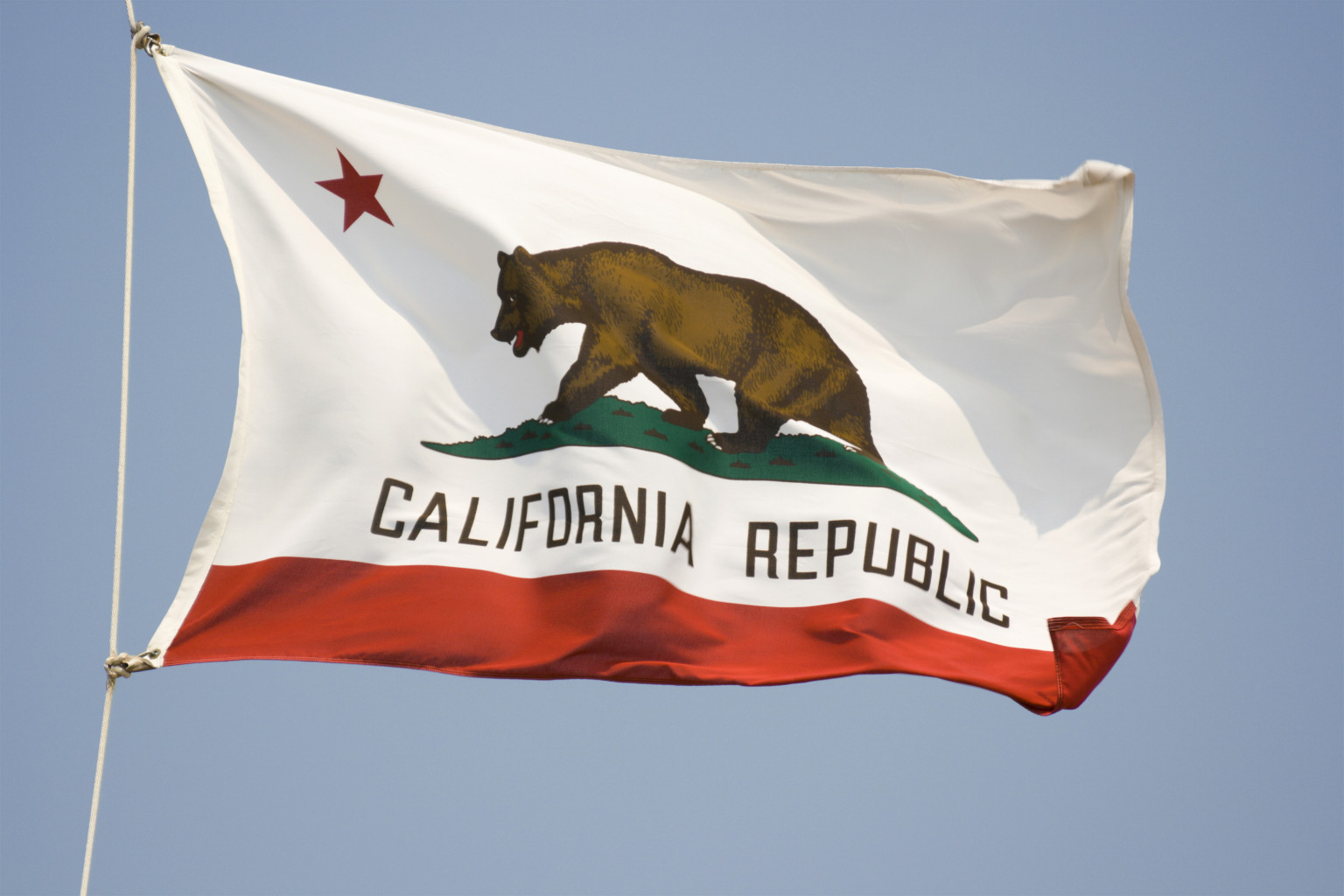 There is no argument that the Tribes have exclusivity to games of chance, including slots and non-poker card games, but the state has been fighting over online poker for more than a decade and they are now arguing about sports betting as well. In 2014 it appeared that the state had finally come to an agreement which would allow online poker to begin when 13 tribes agreed to a set of rules that would allow the tribes and poker clubs to partner with companies to offer a sports betting product. But the motion was shot down when the Morongo band of Indians wouldn’t agree to a bad actor clause that would have excluded PokerStars from operating in California as payback for having offered online poker to the U.S. after the passage of the UIGEA. PokerStars was supposed to be exonerated for those past wrongs and all restrictions against them lifted after agreeing to pay a fine to the DOJ, but the tribes were not prepared to accept that ruling and wanted all “bad actors” excluded and they deemed PokerStars one of those. The Morongo band of Indians and the Bicycle Poker Room, which had an agreement with PokerStars to run the poker product on their behalf, nixed the agreement unless the bad actor clause was lifted. Since the new law would require unanimous approval, it got shelved. To this day any attempts to renew the idea of licensing and regulating online poker has been shot down for the same reasons and the state is no closer to legal online poker.
There is no argument that the Tribes have exclusivity to games of chance, including slots and non-poker card games, but the state has been fighting over online poker for more than a decade and they are now arguing about sports betting as well. In 2014 it appeared that the state had finally come to an agreement which would allow online poker to begin when 13 tribes agreed to a set of rules that would allow the tribes and poker clubs to partner with companies to offer a sports betting product. But the motion was shot down when the Morongo band of Indians wouldn’t agree to a bad actor clause that would have excluded PokerStars from operating in California as payback for having offered online poker to the U.S. after the passage of the UIGEA. PokerStars was supposed to be exonerated for those past wrongs and all restrictions against them lifted after agreeing to pay a fine to the DOJ, but the tribes were not prepared to accept that ruling and wanted all “bad actors” excluded and they deemed PokerStars one of those. The Morongo band of Indians and the Bicycle Poker Room, which had an agreement with PokerStars to run the poker product on their behalf, nixed the agreement unless the bad actor clause was lifted. Since the new law would require unanimous approval, it got shelved. To this day any attempts to renew the idea of licensing and regulating online poker has been shot down for the same reasons and the state is no closer to legal online poker.
After PASPA was shot down, the same groups discussed legalizing sports betting, but that required a change to the California constitution, so the question was put forth to the general populace in a November 2022 referendum as part of the midterm election. Appearing as two separate propositions, Proposition 26 allowed the state’s privately operated racetracks and tribal casinos to offer sports betting at the physical locations, while proposition 27 allowed online sports betting both by the tribes and by private companies under their own brand. By all accounts the advertisements were relentless both for and against both propositions with the online sports books spending almost $300 million asking voters to support proposition 27, while the tribes spent almost $150 million asking voters to vote against proposition 27 and instead, support proposition 26. In the end both propositions were defeated. Proposition 26 failed by an almost 3 to 2 vote, while proposition 27 was voted for by only 16% of the voters. It’s uncertain why the voters were so opposed to legal online sports betting, although analysts said that voters were simply confused by the two propositions plus, there was concern that if proposition 27 succeeded it would allow the private companies like Flutter, which owns both FanDuel and PokerStars, to strongarm the tribes into allowing online poker without the bad actor clause and more importantly, change the law to possibly push the tribes completely out. Similarly, there was concern that a passage of proposition 26 would give the tribes too much power. It was also noted, like Florida, if proposition 26 passed, it could be challenged for violating the IGRA. The same groups are getting their ducks in order to petition for a new referendum in 2024, but unless something major changes, there is no reason to believe a vote in 2024 will be different. Proposition 27 in particular seems dead and that was clear when a Tribal spokesman recently said:
"This initiative (proposition 27) suffered one of the widest defeats in California history and should serve as a cautionary tale to those that attempt to enter the California gaming market without working directly with tribes."
Everything is Bigger
The third big state where sportsbooks are anxious to see sports betting regulated is Texas, and this is the one state where there seems to be some movement. Texas disallows all forms of gambling, except horse racing and dog racing, which is counterproductive, since studies showed that a large percentage of Texans travel at least once a year to Louisiana, Oklahoma or Mexico to play at a casino and upwards of 8 million Texans gamble offshore. 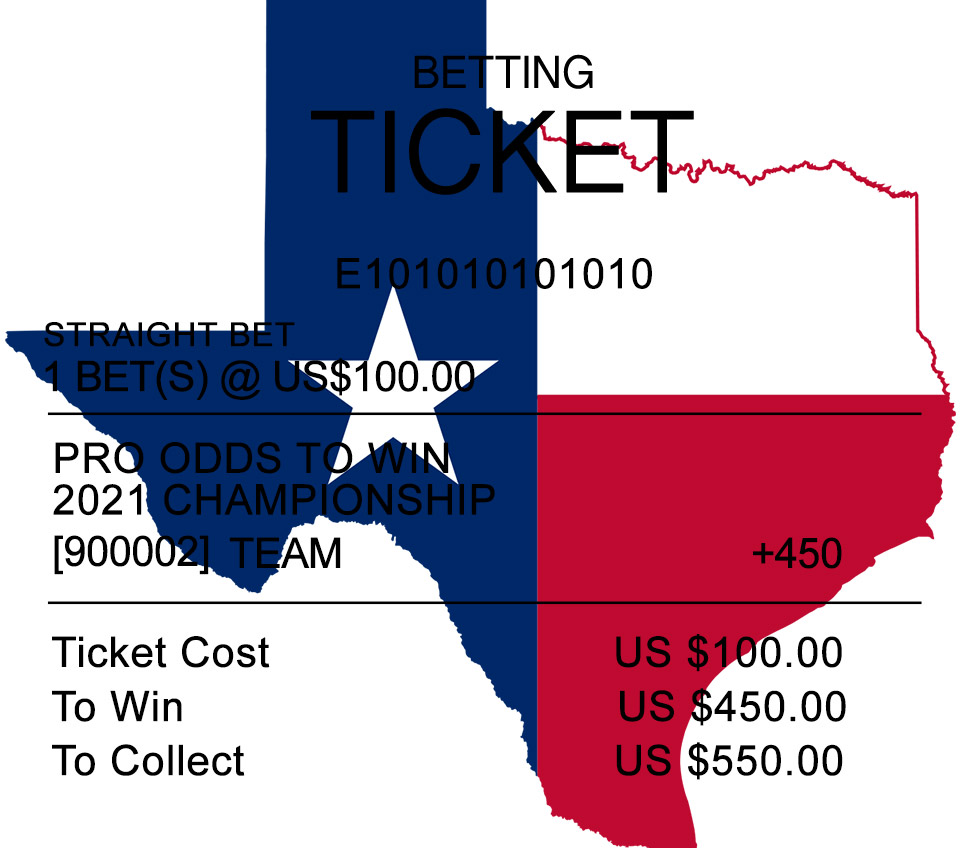 Yet despite discussions of possible gambling expansion in Texas for a few years, the motions went nowhere until this year.
Yet despite discussions of possible gambling expansion in Texas for a few years, the motions went nowhere until this year.
Rep. Charlie Green and Senator Carol Alvarado filed bi-partisan legislation in February that would legalize resort casinos in Texas’ major cities and would allow sports betting to be included, along with the games of chance. The joint resolution would allow up to eight resort casinos in cities like Dallas, Fort Worth, Austin, San Antonio and Houston. Dallas Mavericks owner and Shark Tank billionaire, Mark Cuban, said he would invest in one in the Dallas area. The Las Vegas Sands also indicated they were interested in a casino and no doubt MGM and Caesars will want their names to be considered for any resort casinos too. It is expected that the casinos would increase tourism and allow billions of extra dollars to enter the economy. There is no indication what the revenues would be used for although education and property taxes were mentioned.
At the same time, another bill was introduced in Texas aimed at legalizing online sports betting. Rep Jeff Leach introduced House Bill 1942, which is backed by all the major online companies including FanDuel, DraftKings, BetMGM, BetCaesars, etc., along with all the major sports teams in the state. The two bills are not connected, and it appears the Las Vegas Sands opposes House Bill 1942, since LVSC is still adhering to the Adelsons’ belief that online betting is evil. Leach’s bill would allow mobile and online betting with a tax on gross gaming revenue of 10%, with proceeds aimed at education and lowering property taxes. It is believed to get any traction the tax would have to be higher than that, which Leach said he is willing to consider.
Along with tax revenue, Geren and Alvarado stated that resort casinos would increase tourism to Texas and would create thousands of construction jobs along with full time casino jobs. Leach has said that Texans are already wagering on sporting events online anyways, either offshore or in neighboring states, so he feels Texas should regulate the product to reap the rewards. There are opponents, however, to both bills, including the tribe which runs a small casino in Eagle Pass that would be shut out, as well as Christian groups who oppose gambling for religious and moral reasons, including the standard concerns about addiction and corrupting minors. The casino in Eagle Pass has been under scrutiny for some time as many believe it is operating illegally.
There is real hope that Texas may be serious about increased gambling this time due to bipartisan support in both chambers and at least one poll showing that 85% of Texans support licensed and regulated sports betting. Moreover, the promise of lower property taxes may be a big enough incentive to get even the most hesitant in the population to get on board, since it will affect their pocketbooks. For the bill to go forward it would have to be ratified by 2/3 of both chambers and passed by a majority vote in a referendum. The vote would also rewrite the Texas state constitution.
Georgia
The last state where betting interests would love to see sports betting licensed and regulated is Georgia.
Until recently it seemed almost impossible that any form of casino or sports betting would be legalized in the state since the state constitution only permits lotteries, bingo and charitable gambling, plus the legislature was almost exclusively Republican and the vast majority opposed any gambling expansion. That has changed in recent years, however, after Georgia started voting for more Democrat candidates in the federal and state elections. More than 42% of state legislators are Democrats and on issues like gambling there seems to be proponents on both sides who want to see some tax revenue flow to the state without directly increasing taxes on the citizens. 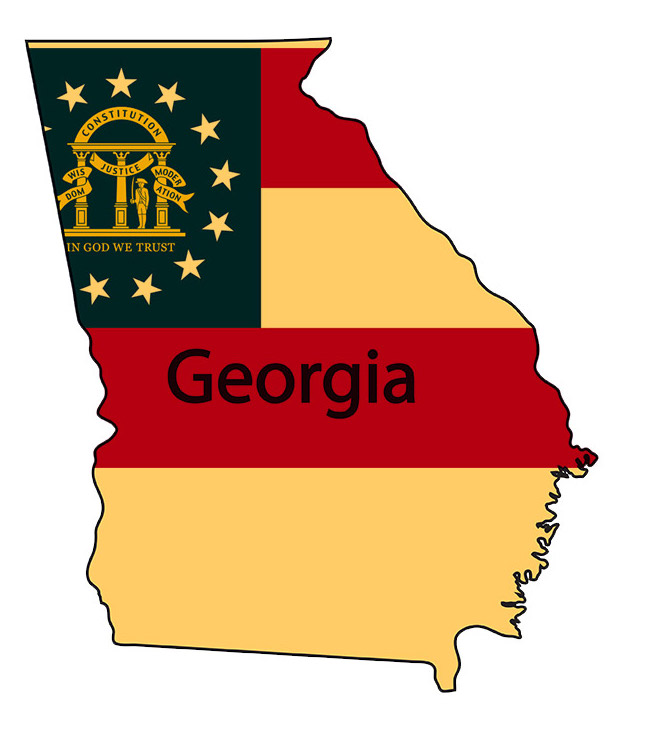 A poll by the University of Georgia also showed that 60% of Georgians approve of sports betting.
A poll by the University of Georgia also showed that 60% of Georgians approve of sports betting.
Consequently, three separate bills were introduced in 2022 and voted on in 2023, including Senate Bill SB57, Assembly Bill SR 140 and House Bill 380. All bills were relatively the same, requiring a change to the Georgia constitution to allow online sports betting. They were supported by Atlanta sports teams and the major sports betting sites. Both the Senate and Assembly bills failed badly, and the House bill was withdrawn when it was clear it could not pass. The legislature did agree, however, to study sports betting again next year, including possibly allowing the Georgia lottery to own and oversee sports betting and enlisting one of the larger companies to operate it, similar to DraftKings running the New Hampshire Sports betting app. It is unlikely that the sports betting companies would be happy with that solution, nor would sports bettors, who generally want an open market. Any change to the constitution that would include legal sports betting would have to pass 2/3 of both chambers and be approved by a majority of voters in a referendum. There is belief that all sides will present a comprehensive analysis later this year of the benefits of licensed and regulated sports betting and gambling companies are prepared to throw millions into promoting the opportunity . . . if there is a real chance of it passing.
So, sports betting has come a long way in the U.S. with more than 2/3 of states having licensed and regulated the product in some shape or form. But with so many of the larger states still on the sidelines, including California, Texas, Florida and Georgia, there is still room for major expansion. It's not likely there will be major movement this year, but expect fireworks in all four states leading up to the 2024 federal election and a possible referendum opportunity to get voters to support sports betting expansion in several states.
Read insights from Hartley Henderson every week here at OSGA and check out Hartley's RUMOR MILL!










